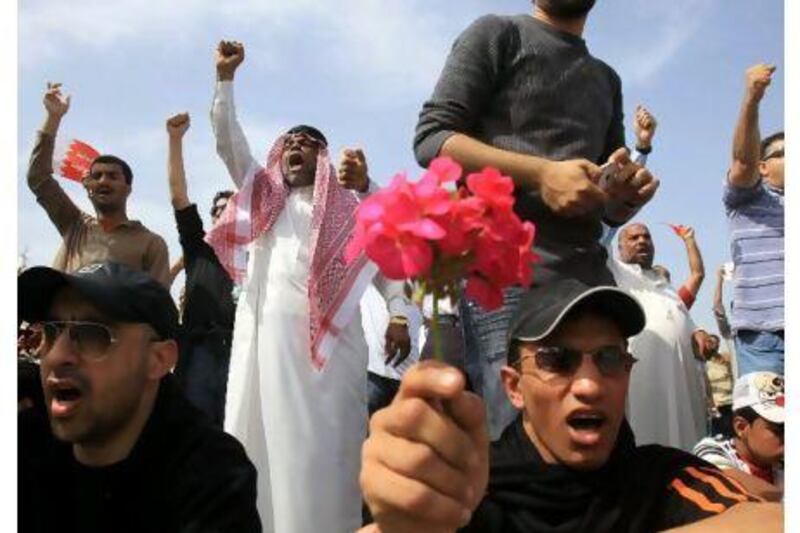MANAMA // The protests that have shaken Bahrain for the past three weeks have focused on demands for political reform and for better access to jobs, housing and education.
But yesterday, thousands of protesters marched on the immigration office in the capital of Manama, railing against a more controversial policy to extend citizenship to Sunnis from Syria, Jordan and other countries.
Ibrahim Sharif, the head of the liberal Waad party, said: "This is a programme to change the fabric of the society and to create a bigger base for the government. We call it 'political naturalisation' which is predicated by political means. The majority do not accept them as citizens; they are seen as a reservoir for voting and for giving security."
Protestors yesterday carried slogans declaring, "The naturalised must get out."
The government has refused to disclose the number of Sunnis who have been granted Bahraini citizenship, and has declined to state the purpose of the naturalisation policy.
But opposition activists say at least 50,000 people have been given a fast track to citizenship in the past 10 years - which they claim amounts to an attempt to tilt the political system further in favour of the Sunnis at the expense of the Shiite majority.
Mr Sharif stressed that Bahrain has long been a destination for "natural migration", primarily for economic reasons, with some being granted citizenship after many years of residency.
But with many of those who have been naturalised for "political" reasons receiving jobs and related benefits, resentment has grown, particularly among Shiites, who account for a majority of the country's 525,000 people and have long complained of discrimination.
"Of course, when you naturalise 50,000 people you have to create jobs, and these are typically government jobs," Mr Sharif said. "If you put politically naturalised people especially in the army and security forces, then you are denying Bahrainis jobs."
The so-called politically naturalised Bahrainis tend to live within Sunni communities in areas such as Muharraq island, where Mohammed al Qassimi lives with his family. Mr al Qassimi, a 59-year-old Sunni, said the impact is felt across Bahraini society.
"We are also suffering from the naturalisation," he said. "They are taking our opportunities to go to the army and police. Our people are waiting and this is wrong."
In a country where an estimated 70 per cent of the population are Shiites, there are many who have carved out successful careers. But, there are many thousands of others who say they have been stagnating in a cycle of poverty and limited opportunities.
Many of the demonstrators calling for change believe they are discriminated against, in contrast to the benefits they say go to those who have recently arrived to the country and been granted citizenship.
"We are Bahraini and we don't get a house or jobs," said Ahmed Abbas, who graduated with a diploma in marketing three years ago hoping to break into the field, save some money, get married and start a family.
Today, Mr Abbas, 23, is unemployed; he was fired from his job as a security guard when he joined the thousands of protesters in Pearl roundabout.
Mr Abbas, who lives with 20 family members in a seven-bedroom home in the village of Nuwaidrat, had been earning around 350 Bahraini dinars [Dh3400] a month and working 12 hours a day seven days a week.
"There are no jobs in sales and marketing for me," he said. "Most of my friends also don't have jobs. Life is difficult for young people, and there is no money to marry or start a family."
Hussein Habib, 33, who works as a taxi driver but has a diploma in hospitality, said: "We are not given a chance. We also want to work in places like the military because we should be the ones defending our country."
Many demonstrators stress they do not resent Bahrain's thousands of expatriate workers or those who have lived on the island for years and are given a path to citizenship.
Abdulaziz Ibrahim, 46, who works as a driver and says he has been waiting since 1993 for government-issued housing or land, said: "If you live here and you work for 20 years and get nationality, there is no problem - you have worked for Bahrain. There are thousands like me. It's not fair. There is no chance right now for government jobs. But, maybe in the future, inshallah, things will be better."





